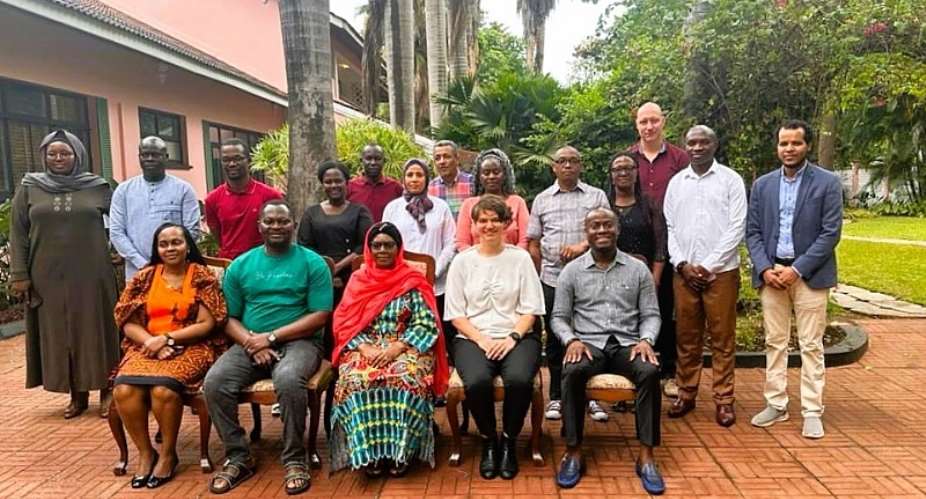The African Court on Human and Peoples’ Rights, in collaboration with the International Committee of the Red Cross (ICRC), has held specialized training on the interplay between International Humanitarian Law (IHL) and International Human Rights Law (IHRL).
The training aimed at empowering legal officers with the necessary expertise required to navigate legal complexities when handling human rights cases arising in situations of armed conflict.
The three-day training held in Moshi, Tanzania, was attended by all legal officers of the African Court, alongside experts from the ICRC country office in Tanzania and the Regional Delegation to East Africa, a statement made available to Communication for Development and Advocacy Consult (CDA Consult), [email protected], which is a development communication advocacy non-governmental organization based in Tema, Ghana, stated.
Lady Justice Imani Doud Aboud, the President of the African Court, emphasized in an address the importance of training for the African Court in equipping staff with the tools necessary to navigate the challenges presented by contemporary conflicts to the protection of human rights.
Dr. Robert Eno, the Registrar of the African Court, also stressed the significance of the training, highlighting its timeliness and relevance.
He emphasized that the training coincides with the African Court’s commitment to upholding excellence and quality in the administration and interpretation of justice, especially in light of the rigorous pursuit of justice across all petitions received.
“Recent developments have seen the African Court confronted with petitions involving disputes between states but also alleging human rights violations in the context of armed conflicts.
“This new reality has highlighted the imperative of the Court possessing a good and solid understanding of international humanitarian law and the latter’s interplay with international human rights law to effectively navigate these intricate issues,” he said.
The Head of the Legal Division of the African Court, Dr. Sègnonna Horace Adjolohoun, also highlighted that the training was critical in enhancing the overall capacity of the African Continental Court’s legal officers, not just in dealing with the current issues that arise from the received petitions but also from potential future applications.
He noted that all the legal officers of the African Court would put to great use the knowledge and expertise acquired during the training, as it also challenged them to apply a multidisciplinary approach to addressing complex legal challenges.
The training employed a combination of interactive lectures by experts, case studies, group discussions, and practical exercises.
Participants also engaged in hands-on activities to reinforce their understanding and application of International Humanitarian Law and International Human Rights Law principles.
Practical applications and case studies at the training were tailored to the African context to ensure relevance and relatability.
Some areas covered under the two focus topics included the right to life, the right to liberty and detention, children in armed conflict situations, derogations, and reparations.
Since its establishment, the African Court has adjudicated multiple human rights cases, issuing judgments that have significantly shaped the normative framework of the African human rights system.
According to statistics, the African Court has received 342 cases and delivered over 200 decisions, including judgments, rulings, and advisory opinions.





 Ejisu by-election: I will be shocked if Aduomi is able to secure 5percent vote —...
Ejisu by-election: I will be shocked if Aduomi is able to secure 5percent vote —...
 University President expresses worry over surge in provocative dressings, indisc...
University President expresses worry over surge in provocative dressings, indisc...
 Avetakpo residents lament disregard shown by Ho West officials, threatening to p...
Avetakpo residents lament disregard shown by Ho West officials, threatening to p...
 New Jakpa palace will be grand symbol of our history and culture — Mahama to Yag...
New Jakpa palace will be grand symbol of our history and culture — Mahama to Yag...
 Prof. Jane Naana has shaken Ghana's political foundation, causing NPP to run hel...
Prof. Jane Naana has shaken Ghana's political foundation, causing NPP to run hel...
 I've been receiving threats after I commended NPP for completing school projects...
I've been receiving threats after I commended NPP for completing school projects...
 Bawumia is ready to debate Mahama any day – Frederick Opare-Ansah
Bawumia is ready to debate Mahama any day – Frederick Opare-Ansah
 Register births at CHPS compounds; don't come to Accra – Birth & Death Registrar...
Register births at CHPS compounds; don't come to Accra – Birth & Death Registrar...
 We never said only 10 BVDs were auctioned – EC replies IMANI
We never said only 10 BVDs were auctioned – EC replies IMANI
 Election 2024: Akufo-Addo willing to trample on Ghana’s constitution – Mahama
Election 2024: Akufo-Addo willing to trample on Ghana’s constitution – Mahama
